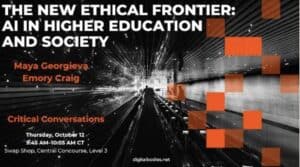If you are at the EDUCAUSE conference in Chicago, join us tomorrow to examine the new ethical frontier we face in higher education. The explosive growth of artificial intelligence (AI), and Generative AI in particular, promises to upend and transform the teaching-learning environment and the administrative operations of our institutions. AI offers a wealth of new possibilities and a tangle of ethical issues that are just beginning to flow throughout our institutions and the world at large.
Here are the details for our session:
The New Ethical Frontier: AI in Higher Education and Society
Thursday, October 12 | 9:45AM–10:05AM CT | Swap Shop, Central Concourse, Level 3Session Type: Breakout SessionDelivery Format: Critical Conversations
The New Ethical Frontier in Higher Education
AI’s pervasive influence in higher education, especially with its capability of generating authorless content, poses fundamental questions for academic integrity and how we will learn in the future. How does one maintain the sanctity of genuine learning experiences when a machine can replicate scholarly content? When AI algorithms can monopolize content creation, it threatens individual creativity and, even more, intellectual rigor.
In the past, learning to read critically was always about more than reading. It developed our critical thinking skills. But today, we can access a summary of any text we need at the click of a button. Is the future of education a world where students can rapidly produce content but are unable to critically understand it?
Moreover, as AI shapes research, assessment, teaching, and learning, it raises new ethical considerations surrounding privacy, fairness, and inclusivity. The digital footprint of every student becomes both the foundation for personalized learning and a potential Pandora’s box of privacy concerns. Some students may eagerly seek this out. We could even see some institutions offering the entire collection of all personal student data with the promise that their AI platforms will make their students more successful academically and in the job market. It would be a bargain hard to refuse – especially for students from lower-income backgrounds where the odds are already stacked against them.
Equally pressing is the issue of fairness. AI systems will begin to play a pivotal role in assessment and admissions, just as they do in corporate and organizational hiring. How do we ensure these systems are devoid of biases and provide equitable opportunities to all students? Who peaks under the curtain to assess the fairness of these systems? New York City, where we are based, is the first major city to require fairness in AI platforms used for hiring and evaluations. It’s a noble effort, but many of the initiative’s critics (ourselves included) see no way the new law can be practically enforced.
AI and Society – Disrupting the Labor Market
Outside the walls of academia, the new ethical frontier stretches even further. We’re witnessing an increasingly palpable digital divide, with access to state-of-the-art technologies becoming a privilege of the few, amplifying societal inequalities. Billions of dollars are pouring into AI projects to improve generative AI to the point where it may put millions of employees out of work.
Job loss projections due to generative AI are all over the place, as are the predictions for how many new jobs will be created from the AI revolution. We see tremendous fear among students in specific disciplines and those already in the workforce. If you’re an avid user of an AI image generator, you have to wonder how design and illustration students feel about their future job prospects. Universities might soon find themselves recalibrating their recruitment strategies, trying to keep in sync with the AI-driven needs of society.
What Are The New Opportunities?
How can we shape an educational landscape that leverages AI’s immense potential while staying rooted in ethical considerations? Strategies to bridge the digital divide, for instance, can ensure equitable access to cutting-edge educational resources, democratizing the learning experience. Furthermore, by equipping students with the skills and knowledge required for an AI-infused future, we can prepare them for dynamic career trajectories and cultivate a generation that not only understands AI but can thrive in the new ethical frontier that we are facing.
In conclusion, as we stand at the precipice of a new era marked by AI’s ubiquity, we bear the collective responsibility of understanding its ethical implications. Our conversation tomorrow at the EDUCAUSE conference is not just timely but imperative. Join us as we take the first tentative steps in navigating a new era for education and society.
Emory Craig is a writer, speaker, and consultant specializing in virtual reality (VR) and artificial intelligence (AI) with a rich background in art, new media, and higher education. A sought-after speaker at international conferences, he shares his unique insights on innovation and collaborates with universities, nonprofits, businesses, and international organizations to develop transformative initiatives in XR, AI, and digital ethics. Passionate about harnessing the potential of cutting-edge technologies, he explores the ethical ramifications of blending the real with the virtual, sparking meaningful conversations about the future of human experience in an increasingly interconnected world.

